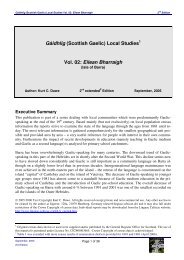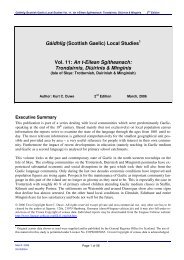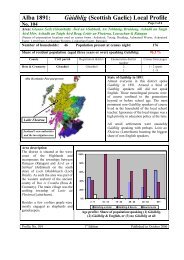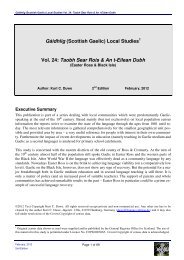Breton – an endangered language of Europe - Linguae Celticae
Breton – an endangered language of Europe - Linguae Celticae
Breton – an endangered language of Europe - Linguae Celticae
Create successful ePaper yourself
Turn your PDF publications into a flip-book with our unique Google optimized e-Paper software.
ª International Committee for the Defense <strong>of</strong> the <strong>Breton</strong> L<strong>an</strong>guage<br />
<strong>Breton</strong> <strong>–</strong> <strong>an</strong> end<strong>an</strong>gered l<strong>an</strong>guage<br />
<strong>of</strong> <strong>Europe</strong><br />
Lois Kuter, Secretary for the U.S. Br<strong>an</strong>ch <strong>of</strong> the<br />
International Committee for the Defense <strong>of</strong> the <strong>Breton</strong><br />
L<strong>an</strong>guage (U.S. ICDBL). kuter@netreach.net<br />
This is a modification <strong>of</strong> a presentation given to a class<br />
on End<strong>an</strong>gered L<strong>an</strong>guages at the University <strong>of</strong><br />
The <strong>Breton</strong> L<strong>an</strong>guage is a Celtic L<strong>an</strong>guage<br />
The <strong>Breton</strong> l<strong>an</strong>guage is one <strong>of</strong> dozens <strong>of</strong> “lesser used”<br />
l<strong>an</strong>guages in <strong>Europe</strong> It’s a Celtic l<strong>an</strong>guage. There are<br />
five others: Irish Gaelic <strong>an</strong>d Scottish Gaelic, M<strong>an</strong>x,<br />
Welsh, <strong>an</strong>d Cornish (yes, it is alive contrary to m<strong>an</strong>y<br />
things one will read). Some people also include Galicia<br />
<strong>an</strong>d Asturias (in Spain) in the family <strong>of</strong> Celts. While<br />
these regions have a Celtic identity based on history<br />
<strong>an</strong>d traditional culture, they do not have Celtic<br />
l<strong>an</strong>guages, although the l<strong>an</strong>guages spoken in those<br />
regions today are unique.<br />
When you hear the word “Celtic” today in the U.S., it is<br />
mostly thrown about to sell something Irish or Scottish<br />
… a music CD or festival. The noun “Celt” or adjective<br />
”Celtic” is more precisely used to apply to people,<br />
places or things where there is a link to a Celtic<br />
l<strong>an</strong>guage. More broadly it refers to the cultures <strong>of</strong> the<br />
places where those l<strong>an</strong>guages have been found.<br />
So why is there a Celtic l<strong>an</strong>guage in Fr<strong>an</strong>ce?<br />
I am not a histori<strong>an</strong> but we need to start with a little<br />
history to situate Britt<strong>an</strong>y <strong>an</strong>d the <strong>Breton</strong> l<strong>an</strong>guage. This<br />
is a very simplistic summary. To underst<strong>an</strong>d Britt<strong>an</strong>y<br />
today, it is import<strong>an</strong>t to study its history in much more<br />
depth.<br />
Celts were being distinguished as a separate people by<br />
histori<strong>an</strong>s in the 8 th through 1 st centuries BC based on<br />
social org<strong>an</strong>ization, dress, warfare methods, <strong>an</strong>d<br />
especially l<strong>an</strong>guage. Ancient Celts spread westward<br />
from the D<strong>an</strong>ube Valley <strong>an</strong>d a presence in Britt<strong>an</strong>y was<br />
noted by the La Tene period in 500 BC. The Gauls <strong>of</strong><br />
this period (the Latin name for people called Keltoi in<br />
Greek) were a set <strong>of</strong> various peoples. Ceasar named<br />
five different Celtic nations in Britt<strong>an</strong>y <strong>–</strong> then called<br />
“Armorica”.<br />
The Rom<strong>an</strong>s invaded Britt<strong>an</strong>y in the first century BC.<br />
The Celts fought them but were defeated. The Rom<strong>an</strong><br />
presence in Britt<strong>an</strong>y was peaceful <strong>an</strong>d this was a period<br />
when roads <strong>an</strong>d towns were built. During the 5 th <strong>an</strong>d 6 th<br />
century especially, but also before this, there was a<br />
great deal <strong>of</strong> travel between Celtic peoples in Britain<br />
<strong>an</strong>d Armorica <strong>–</strong> especially by early Christi<strong>an</strong>s who were<br />
Kentucky, Linguistics Program, March 30, 2004. It was<br />
published in Bro Nevez No. 90, May 2004. Please do<br />
not quite or copy materials from this article without the<br />
permission <strong>of</strong> the author. The views expressed in this<br />
article are those <strong>of</strong> the author <strong>an</strong>d do not necessarily<br />
represent ICDBL philosophy or policy.<br />
both spiritual <strong>an</strong>d political leaders. The shift to the name<br />
Britt<strong>an</strong>y bears witness to this travel.<br />
This is a complicated period with settlement <strong>of</strong> a great<br />
number <strong>of</strong> Celts from Wales, Cornwall <strong>an</strong>d Devon, as<br />
well as Irel<strong>an</strong>d, in Britt<strong>an</strong>y. This was a period <strong>of</strong> uneasy<br />
relations between the Fr<strong>an</strong>cs (French) <strong>an</strong>d <strong>Breton</strong>s.<br />
During the 5 th to 7 th centuries there was const<strong>an</strong>t<br />
warfare on the borderl<strong>an</strong>ds which are now roughly the<br />
same as the present day border between Britt<strong>an</strong>y <strong>an</strong>d<br />
Fr<strong>an</strong>ce.<br />
Britt<strong>an</strong>y was made up <strong>of</strong> several principalities <strong>–</strong> united<br />
only in the 9 th century under Nominoe who fought to<br />
keep Britt<strong>an</strong>y independent. Britt<strong>an</strong>y as a kingdom under<br />
Nominoe marked the peak exp<strong>an</strong>sion <strong>of</strong> the <strong>Breton</strong><br />
l<strong>an</strong>guage, but Britt<strong>an</strong>y was never all <strong>Breton</strong> speaking.<br />
Those in the east spoke Gallo, <strong>an</strong> outgrowth <strong>of</strong> late<br />
Latin influenced by the Celtic l<strong>an</strong>guage spoken by the<br />
Gauls. It developed in parallel to the French dialects<br />
now spoken elsewhere in Fr<strong>an</strong>ce: that <strong>of</strong> Paris, <strong>an</strong>d<br />
also Picard, Norm<strong>an</strong>d, Angevin, M<strong>an</strong>ceau <strong>an</strong>d Poitevin.<br />
Gallo is unique, but not a Celtic l<strong>an</strong>guage.<br />
The <strong>Breton</strong> nobility had trouble accepting a king. The<br />
10 th to 12 th centuries were marked by internal battles<br />
where <strong>Breton</strong> dukes fought each other for domin<strong>an</strong>ce.<br />
Competing alli<strong>an</strong>ces with Engl<strong>an</strong>d or Fr<strong>an</strong>ce me<strong>an</strong>t that<br />
the end <strong>of</strong> independence would be inevitable.<br />
During the 12 th through 17 th centuries <strong>Breton</strong> nobility<br />
<strong>an</strong>d higher clergy adopted French as a more<br />
international l<strong>an</strong>guage, <strong>an</strong>d cities in Britt<strong>an</strong>y became<br />
largely French-speaking (although also <strong>Breton</strong><br />
speaking). To be urb<strong>an</strong> has long been viewed as<br />
equivalent to speaking French.<br />
Thus, French was the l<strong>an</strong>guage used by <strong>an</strong> urb<strong>an</strong> elite<br />
while <strong>Breton</strong> <strong>an</strong>d Gallo were l<strong>an</strong>guages <strong>of</strong> the<br />
countryside <strong>an</strong>d smaller towns. Britt<strong>an</strong>y has always<br />
been multilingual. The boundary <strong>of</strong> Britt<strong>an</strong>y is not<br />
determined by the correspondence <strong>of</strong> the <strong>Breton</strong><br />
l<strong>an</strong>guage to a particular geographic realm, but by early<br />
religious <strong>an</strong>d political boundaries <strong>–</strong> bishoprics were also<br />
administrative areas overlaid by territories claimed by<br />
<strong>Breton</strong> Dukes.<br />
Page 1 <strong>of</strong> 9 http://www.breizh.net/ICDBL/saozg/end<strong>an</strong>gered.htm
ª International Committee for the Defense <strong>of</strong> the <strong>Breton</strong> L<strong>an</strong>guage<br />
Britt<strong>an</strong>y was <strong>an</strong>nexed to Fr<strong>an</strong>ce in 1532 through<br />
complex marriage alli<strong>an</strong>ces. But it retained some<br />
import<strong>an</strong>t independence with a parliament, <strong>an</strong>d control<br />
over taxes <strong>an</strong>d army conscription. Britt<strong>an</strong>y was brought<br />
into the French nation-state with the French Revolution<br />
in 1789. That was the beginning <strong>of</strong> a political<br />
centralization that would force people in Fr<strong>an</strong>ce to<br />
become French, <strong>an</strong>d thus good citizens.<br />
We’ll get back to that idea in looking at the ch<strong>an</strong>ging<br />
situation <strong>of</strong> the <strong>Breton</strong> l<strong>an</strong>guage.<br />
Just how m<strong>an</strong>y people speak the <strong>Breton</strong><br />
l<strong>an</strong>guage?<br />
The French government has never included questions<br />
about l<strong>an</strong>guages in its census so until recent times<br />
when some fairly reliable surveys have been taken, it<br />
has been difficult to know exactly how m<strong>an</strong>y people<br />
spoke <strong>Breton</strong> at <strong>an</strong>y given period <strong>of</strong> history.<br />
In 1914 it is said that over 1 million spoke <strong>Breton</strong> west<br />
<strong>of</strong> the border between <strong>Breton</strong> <strong>an</strong>d Gallo-speaking<br />
regions <strong>–</strong> roughly 90% <strong>of</strong> the population <strong>of</strong> the western<br />
half <strong>of</strong> Britt<strong>an</strong>y. In 1945 it was about 75%, <strong>an</strong>d today, in<br />
all <strong>of</strong> Britt<strong>an</strong>y the most optimistic estimate would be that<br />
20% <strong>of</strong> <strong>Breton</strong>s c<strong>an</strong> speak <strong>Breton</strong>. Britt<strong>an</strong>y has a<br />
population <strong>of</strong> roughly 4 million -- if you include the<br />
department <strong>of</strong> Loire-Atl<strong>an</strong>tique which the Vichy<br />
government chopped <strong>of</strong>f from “<strong>of</strong>ficial” Britt<strong>an</strong>y in 1941.<br />
Three-quarters <strong>of</strong> the estimated 200 to 250,000 <strong>Breton</strong><br />
speakers using <strong>Breton</strong> as <strong>an</strong> everyday l<strong>an</strong>guage today<br />
are over the age <strong>of</strong> 65. What does that say about the<br />
future for <strong>Breton</strong>?<br />
How did the numbers <strong>of</strong> <strong>Breton</strong> speakers dwindle?<br />
Image is everything, <strong>an</strong>d this has to do with why<br />
<strong>Breton</strong>s at a certain period in history decided they must<br />
speak French <strong>an</strong>d spare their children knowledge <strong>of</strong> the<br />
<strong>Breton</strong> l<strong>an</strong>guage.<br />
Image No. 1: <strong>Breton</strong> is a rural, backward-looking,<br />
un-modern l<strong>an</strong>guage fit only for the barnyard.<br />
Fañch Elegoët, a <strong>Breton</strong> sociologist, did <strong>an</strong> extensive<br />
study <strong>of</strong> rural <strong>Breton</strong> speakers in northwestern Britt<strong>an</strong>y<br />
in the 1960s <strong>an</strong>d 70s <strong>–</strong> primarily through oral histories.<br />
He found that <strong>Breton</strong>s had internalized the following<br />
view <strong>of</strong> <strong>Breton</strong>:<br />
<strong>Breton</strong> …. Is a peas<strong>an</strong>t patois, unable to insure<br />
communication even with the neighboring village, even<br />
more incapable <strong>of</strong> expressing the modern world <strong>–</strong> the<br />
world <strong>of</strong> tractors, automobiles, airpl<strong>an</strong>es <strong>an</strong>d television.<br />
A l<strong>an</strong>guage only good enough to talk to cows <strong>an</strong>d pigs.<br />
From that you get the refusal to tr<strong>an</strong>smit this l<strong>an</strong>guage<br />
to children <strong>–</strong> a l<strong>an</strong>guage considered to be a burden, a<br />
h<strong>an</strong>dicap in social promotion, a source <strong>of</strong> humiliation<br />
<strong>an</strong>d shame (Elegoët 1978)<br />
Because <strong>Breton</strong>s learned to feel that the <strong>Breton</strong><br />
l<strong>an</strong>guage was vastly inferior to French, m<strong>an</strong>y parents in<br />
post World War II Britt<strong>an</strong>y made the decision to do<br />
everything possible to insure that their children spoke<br />
French <strong>–</strong> that me<strong>an</strong>t using French when at all possible<br />
to speak to children in the home. This me<strong>an</strong>t that you<br />
had households where gr<strong>an</strong>d parents spoke only<br />
<strong>Breton</strong>, parents spoke <strong>Breton</strong> <strong>an</strong>d some French, <strong>an</strong>d<br />
children spoke only French (although they could<br />
underst<strong>an</strong>d some <strong>Breton</strong> even if discouraged from<br />
speaking it themselves, for their own good). Thus<br />
children were being cut <strong>of</strong>f from gr<strong>an</strong>dparents <strong>an</strong>d older<br />
relatives. Imagine a family gathering where all the<br />
adults are conversing <strong>an</strong>d telling funny stories in<br />
<strong>Breton</strong>. You’re 12 <strong>an</strong>d you c<strong>an</strong> follow a little bit <strong>of</strong> it, but<br />
feel very much left out <strong>of</strong> the fun because you c<strong>an</strong>’t get<br />
the jokes <strong>an</strong>d you c<strong>an</strong>’t express yourself in <strong>Breton</strong>.<br />
But parents firmly believed that social <strong>an</strong>d economic<br />
progress for their kids was dependent on mastering<br />
French <strong>an</strong>d ab<strong>an</strong>doning <strong>Breton</strong>.<br />
How did that conviction come about? - The schools<br />
played a big role<br />
In 1863, one-fifth <strong>of</strong> people <strong>of</strong> Fr<strong>an</strong>ce spoke no French<br />
at all. You didn’t need it. You stayed in school only a<br />
very short time <strong>an</strong>d then worked on the farm <strong>an</strong>d rarely<br />
traveled far enough to use <strong>an</strong>ything but the local lingo.<br />
Compulsory attend<strong>an</strong>ce at school was introduced in<br />
1882. Jules Ferry, the French Education Minister at the<br />
time considered <strong>Breton</strong> to be “a barbarous relic <strong>of</strong><br />
<strong>an</strong>other age.”<br />
The impact <strong>of</strong> compulsory schooling was not immediate<br />
since in Britt<strong>an</strong>y children still left school at a pretty<br />
young age to work on farms or go <strong>of</strong>f to sea. But long<br />
before this, teachers had a mission which they took<br />
very seriously. In 1845 teachers in Finistère, the<br />
western department <strong>of</strong> Britt<strong>an</strong>y, were reminded by the<br />
sub-prefecture: “Above all gentlemen, remember that<br />
you have no higher purpose th<strong>an</strong> to kill the <strong>Breton</strong><br />
l<strong>an</strong>guage."<br />
Image No. 2: <strong>Breton</strong> is a hindr<strong>an</strong>ce to good<br />
citizenship<br />
Not only was <strong>Breton</strong> considered a worthless l<strong>an</strong>guage,<br />
it was also a hindr<strong>an</strong>ce to becoming a good citizen <strong>of</strong><br />
Fr<strong>an</strong>ce. It was the role <strong>of</strong> the teacher to turn children <strong>of</strong><br />
Fr<strong>an</strong>ce into good French citizens. That me<strong>an</strong>t making<br />
them into French speakers. Non-French l<strong>an</strong>guages<br />
were seen as a threat to national unity. There’s <strong>an</strong> <strong>of</strong>ten<br />
Page 2 <strong>of</strong> 9 http://www.breizh.net/ICDBL/saozg/end<strong>an</strong>gered.htm
ª International Committee for the Defense <strong>of</strong> the <strong>Breton</strong> L<strong>an</strong>guage<br />
quoted line from 1927 by the Minister <strong>of</strong> National<br />
Education at that time that states: “for the linguistic unity<br />
<strong>of</strong> Fr<strong>an</strong>ce, the <strong>Breton</strong> l<strong>an</strong>guage must disappear.”<br />
Teachers used ridicule <strong>an</strong>d humiliation <strong>an</strong>d corporal<br />
punishment to convince little children that they should<br />
not use <strong>Breton</strong> at school or <strong>an</strong>ywhere near the<br />
schoolyard. <strong>Breton</strong> parents who made the decision not<br />
to speak <strong>Breton</strong> to their children in the 50s <strong>an</strong>d 60s<br />
<strong>of</strong>ten cited their memories <strong>of</strong> humiliation in school as<br />
one reason.<br />
Image no. 3 <strong>–</strong> <strong>Breton</strong> is a l<strong>an</strong>guage <strong>of</strong> the powerless<br />
For men who spoke no, or very little, French, serving in<br />
the army was a rude awakening.<br />
Military service for <strong>Breton</strong> speakers was a lesson in<br />
what it is like to be powerless to take charge <strong>of</strong> your<br />
own life. There are some famous stories (possibly true)<br />
<strong>of</strong> how <strong>Breton</strong>s were thought to be extremely brave<br />
because they would cry out what was heard as “à la<br />
guerre” (in French “to war”) when in <strong>Breton</strong> they were<br />
pleading<br />
“d’ar ger” (“to home”). There’s <strong>an</strong>other story set in<br />
World War II where a soldier unable to speak French<br />
uses the word “Ya” (“yes” in <strong>Breton</strong>). This reinforces the<br />
idea that he must be speaking Germ<strong>an</strong> <strong>an</strong>d for his<br />
resist<strong>an</strong>ce he is executed. <strong>Breton</strong> really doesn’t sound<br />
at all like Germ<strong>an</strong>, but it is unintelligible to a French<br />
speaker.<br />
The army definitely made <strong>an</strong> impact on <strong>Breton</strong><br />
speakers. Both World War I <strong>an</strong>d II presented a bigger<br />
world where to be modern was to speak French. Men<br />
brought not only this idea back home, but also ch<strong>an</strong>ges<br />
in clothing, m<strong>an</strong>ners <strong>an</strong>d music. They also remembered<br />
that French was the l<strong>an</strong>guage <strong>of</strong> those in charge.<br />
Sociologist F<strong>an</strong>ch Elegoet found in his oral history work<br />
that the army experience totally reinforced <strong>Breton</strong>s’<br />
negative view <strong>of</strong> their own l<strong>an</strong>guage. He quotes <strong>an</strong> 80year<br />
old: “If you c<strong>an</strong>not defend yourself in French, what<br />
c<strong>an</strong> you do? You c<strong>an</strong> only keep quiet <strong>an</strong>d let others<br />
step all over you.”<br />
Image No. 4 <strong>–</strong> To get ahead in the world, you must<br />
speak French<br />
In the post war period <strong>Breton</strong> farmers were increasingly<br />
drawn into a wider market where French was spoken. It<br />
was no longer sufficient to travel to the local market.<br />
Exposure to a wider world was slowed by Britt<strong>an</strong>y<br />
isolation by l<strong>an</strong>d travel. Railroads ch<strong>an</strong>ged that,<br />
reaching the far west <strong>of</strong> Britt<strong>an</strong>y in the 1860s <strong>an</strong>d<br />
smaller rural outposts in the 1880s. While roads were<br />
poorly developed, the trains opened things up a great<br />
deal.<br />
It is import<strong>an</strong>t to note that when it came to the sea,<br />
<strong>Breton</strong>s had long been world travelers as explorers <strong>an</strong>d<br />
as fishermen, <strong>an</strong>d as a strong element <strong>of</strong> the French<br />
Navy. Thus coastal towns were also places where<br />
French might be heard.<br />
Getting ahead in the world me<strong>an</strong>t learning French. The<br />
need to emigrate to larger cities or out <strong>of</strong> Britt<strong>an</strong>y to find<br />
work or a better job required learning French … but not<br />
necessarily ab<strong>an</strong>doning <strong>Breton</strong>.<br />
Image No. 5 <strong>–</strong> The “littleness” <strong>of</strong> <strong>Breton</strong>. <strong>Breton</strong> is<br />
not a true l<strong>an</strong>guage<br />
It is one thing to w<strong>an</strong>t to improve your life by learning<br />
<strong>an</strong>other l<strong>an</strong>guage, but it is quite <strong>an</strong>other to reject the<br />
l<strong>an</strong>guage you grew up with or that your parents <strong>an</strong>d<br />
gr<strong>an</strong>dparents speak.<br />
Media like books <strong>an</strong>d newspapers, as well as schools<br />
<strong>an</strong>d military service all brought <strong>Breton</strong>s in contact with a<br />
particular attitude about non-French l<strong>an</strong>guages in<br />
Fr<strong>an</strong>ce. These media all gave you the message that<br />
<strong>Breton</strong> was a “patois.” Indeed the word “baragouin”<br />
which is used in French to note a jumble <strong>of</strong> incorrect or<br />
incomprehensible l<strong>an</strong>guage is rooted in the <strong>Breton</strong><br />
words “bara” for bread <strong>an</strong>d “gwin” (wine) or “gwenn”<br />
(white). French people <strong>of</strong> <strong>an</strong>y social st<strong>an</strong>ding looked at<br />
the <strong>Breton</strong> l<strong>an</strong>guage as baragouin. It was (<strong>an</strong>d still is)<br />
very easy for <strong>Breton</strong>s to get the idea that <strong>Breton</strong> is a<br />
“little l<strong>an</strong>guage” <strong>of</strong> the “past,” not worth the effort <strong>of</strong><br />
learning. In speaking <strong>of</strong> the teaching <strong>of</strong> regional<br />
l<strong>an</strong>guages in French schools, a Pr<strong>of</strong>essor at the<br />
University <strong>of</strong> Paris III in 1975 questions “ … is it wise or<br />
opportune to urge little French children towards a bi- or<br />
trilingualism turned not toward the future <strong>of</strong> the pl<strong>an</strong>et,<br />
but towards the past <strong>of</strong> a little country?”<br />
Image No. 6 The gr<strong>an</strong>deur <strong>of</strong> French<br />
French has been promoted not only as the l<strong>an</strong>guage <strong>of</strong><br />
modernity <strong>an</strong>d good citizenship for French patriots, but<br />
it alone c<strong>an</strong> bring Fr<strong>an</strong>ce world esteem <strong>an</strong>d gr<strong>an</strong>deur.<br />
French President Pompidou stated in 1972: “There is<br />
no place for regional l<strong>an</strong>guages in a Fr<strong>an</strong>ce destined to<br />
mark <strong>Europe</strong> with its seal.”<br />
French is the l<strong>an</strong>guage <strong>of</strong> civilization itself. Here’s a<br />
wonderful quote from 1967 by Waldimir d’Ormesson,<br />
member <strong>of</strong> the Académie Fr<strong>an</strong>çaise <strong>an</strong>d President <strong>of</strong><br />
the administrative council <strong>of</strong> the ORTF (Org<strong>an</strong>isation for<br />
French Radio <strong>an</strong>d Television).<br />
“All Frenchmen are conscious <strong>of</strong> the import<strong>an</strong>ce <strong>of</strong> the<br />
l<strong>an</strong>guage that is common to them. When they<br />
remember the role it has played for ten centuries in the<br />
Page 3 <strong>of</strong> 9 http://www.breizh.net/ICDBL/saozg/end<strong>an</strong>gered.htm
ª International Committee for the Defense <strong>of</strong> the <strong>Breton</strong> L<strong>an</strong>guage<br />
slow formation <strong>of</strong> the nation, they feel a great respect<br />
for it. Secondly, French is not only our l<strong>an</strong>guage: it was,<br />
it is, <strong>an</strong>d it must remain one <strong>of</strong> the instruments <strong>of</strong><br />
civilization. In this respect it represents <strong>an</strong> international<br />
public service.” (Haut comité pour la défense et<br />
l’exp<strong>an</strong>sion de la l<strong>an</strong>gue fr<strong>an</strong>çaise 1967)<br />
And it was this kind <strong>of</strong> thinking that the French took to<br />
every part <strong>of</strong> the world they colonized. In a 1969 article<br />
called “Fr<strong>an</strong>cophonie: The French <strong>an</strong>d Africa” Pierre<br />
Axed<strong>an</strong>dre sums it all up as follows:<br />
“Whether in Indochina or in North Africa or <strong>an</strong>ywhere<br />
else, little was left for the local l<strong>an</strong>guages, which were<br />
expected to be eventually as thoroughly obliterated by<br />
French as <strong>Breton</strong>, Basque or Provençal. French was<br />
taught not so much as a more efficient instrument <strong>of</strong><br />
modern, wide-r<strong>an</strong>ging communication: it was taught as<br />
the key to a new way <strong>of</strong> life, or even as a way <strong>of</strong> life<br />
itself.” (Alex<strong>an</strong>dre 1969)<br />
Image No. 7 <strong>–</strong> <strong>Breton</strong> is not legal<br />
Making French citizens <strong>of</strong> people living within its<br />
borders happened on a number <strong>of</strong> levels. L<strong>an</strong>guage<br />
ch<strong>an</strong>ge was also on the personal level <strong>of</strong> naming your<br />
children. A law in 1803 obliged parents to choose<br />
children’s’ names from one <strong>of</strong> several authorized<br />
calendars <strong>of</strong> names <strong>of</strong> Catholic saints, revolutionary<br />
heroes, or historic figures (real, not mythical) living<br />
before the Middle Ages. Thus it was illegal to name<br />
your child Gwendal, Soazig or Erw<strong>an</strong>. People <strong>of</strong> course<br />
continued to use non-<strong>of</strong>ficial names for each other, but<br />
these were not your <strong>of</strong>ficial name. As a French citizen<br />
you were Maurice; among your <strong>Breton</strong> friends <strong>an</strong>d<br />
family you were Morv<strong>an</strong>. In 1966 the statutes were<br />
eased up a bit <strong>an</strong>d in 1987 “local custom” was taken<br />
into consideration if your local civil serv<strong>an</strong>t was willing<br />
to allow this. In 1993, parents were finally free to enter<br />
<strong>an</strong>y name (within reason) on a birth certificate.<br />
<strong>Breton</strong> names have become very popular <strong>–</strong> a mark <strong>of</strong><br />
pride in identity, but also just a choice <strong>of</strong> a nicesounding<br />
name.<br />
So why hasn’t <strong>Breton</strong> been obliterated yet?<br />
<strong>Breton</strong>s have fought for their l<strong>an</strong>guage<br />
There has long been a core <strong>of</strong> people in Britt<strong>an</strong>y who<br />
have felt that <strong>Breton</strong> was a l<strong>an</strong>guage worth defending.<br />
In the 19 th century it tended to be Rom<strong>an</strong>ticists,<br />
aristocrats, <strong>an</strong>d clergy who collected oral traditions <strong>–</strong><br />
songs <strong>an</strong>d tales, <strong>an</strong>d popular theater texts. Magazines<br />
were published in <strong>Breton</strong> <strong>an</strong>d by the end <strong>of</strong> the century<br />
it was not just oral literature that was promoted but<br />
social <strong>an</strong>d economic topics were also being presented<br />
in <strong>Breton</strong>.<br />
While the 19 th century collectors gave <strong>Breton</strong> <strong>an</strong> image<br />
<strong>of</strong> being a bit dusty <strong>an</strong>d certainly <strong>an</strong>cient, it also brought<br />
prestige to <strong>Breton</strong> as a l<strong>an</strong>guage capable <strong>of</strong> great<br />
literature.<br />
In the 20 th century the creation <strong>of</strong> a new literature was<br />
promoted <strong>–</strong> particularly through the org<strong>an</strong>ization called<br />
Gwalarn. The scholars <strong>an</strong>d writers associated with this<br />
were out to prove that <strong>Breton</strong> was a modern l<strong>an</strong>guage,<br />
with <strong>an</strong> international outlook, capable <strong>of</strong> st<strong>an</strong>dardization<br />
<strong>an</strong>d the creation <strong>of</strong> new vocabulary.<br />
The study <strong>of</strong> <strong>Breton</strong> <strong>an</strong>d the creation <strong>of</strong> teaching<br />
materials <strong>an</strong>d dictionaries has tended to be primarily<br />
outside <strong>of</strong> the university <strong>–</strong> amateur scholars studying<br />
the <strong>Breton</strong> <strong>of</strong> their own neighborhood or working more<br />
widely on the problem <strong>of</strong> creating a “national” l<strong>an</strong>guage.<br />
<strong>Breton</strong>s have sometimes been their own worst enemy.<br />
The promotion <strong>of</strong> <strong>Breton</strong> as a l<strong>an</strong>guage for schools <strong>an</strong>d<br />
literature has suffered from factions. There are four<br />
major dialects within <strong>Breton</strong>. Local pride <strong>an</strong>d identities<br />
me<strong>an</strong>t that <strong>Breton</strong> speakers <strong>of</strong>ten chose to not<br />
underst<strong>an</strong>d other dialects. However, when it came to<br />
making money in the marketplace, they had no problem<br />
communicating with <strong>Breton</strong> speakers using a different<br />
dialect. And onion sellers from northwestern Britt<strong>an</strong>y<br />
crossed the ch<strong>an</strong>nel <strong>an</strong>d had no problem<br />
communicating as brothers with Welsh speakers.<br />
The rift between dialect speakers has been enh<strong>an</strong>ced in<br />
arguments over the formation <strong>of</strong> orthographies. How do<br />
you st<strong>an</strong>dardize <strong>Breton</strong> <strong>an</strong>d still represent the specific<br />
nature <strong>of</strong> the dialects. St<strong>an</strong>dardization has been<br />
bogged down particularly in personal factions <strong>–</strong> the<br />
most import<strong>an</strong>t one still persistent from World War II<br />
based on the pitting <strong>of</strong> <strong>Breton</strong> nationalists against<br />
Resist<strong>an</strong>ce particip<strong>an</strong>ts in WWII. I’ll get to that a little<br />
later. Using a particular orthography has sent a strong<br />
political message at times.<br />
Another problem area has been a rift between “native<br />
speakers” <strong>an</strong>d what are called “Neo-bretonn<strong>an</strong>ts” <strong>–</strong><br />
those learning it as a second l<strong>an</strong>guage. It is felt by<br />
those who have had the good fortune to grow up<br />
speaking <strong>Breton</strong> that those learning it as a second<br />
l<strong>an</strong>guage c<strong>an</strong> never master <strong>Breton</strong>. Second l<strong>an</strong>guage<br />
learners have been stereotyped as <strong>an</strong> urb<strong>an</strong> elite with<br />
no interest in underst<strong>an</strong>ding the purer <strong>an</strong>d more<br />
expressive <strong>Breton</strong> <strong>of</strong> rural <strong>Breton</strong>s <strong>–</strong> the true “people.” It<br />
is felt by some that second l<strong>an</strong>guage learners are<br />
doomed to speak a <strong>Breton</strong> that is highly influenced by<br />
French. There has been resist<strong>an</strong>ce on the part <strong>of</strong> native<br />
speakers to the creation <strong>of</strong> new vocabulary <strong>–</strong> viewed as<br />
Page 4 <strong>of</strong> 9 http://www.breizh.net/ICDBL/saozg/end<strong>an</strong>gered.htm
ª International Committee for the Defense <strong>of</strong> the <strong>Breton</strong> L<strong>an</strong>guage<br />
“chemical” <strong>Breton</strong>. Sadly, those who do have a richer<br />
mastery <strong>of</strong> <strong>Breton</strong> have not always been in the forefront<br />
when it comes to teaching <strong>Breton</strong> or speaking up in its<br />
defesne, <strong>an</strong>d have preferred to spend time criticizing<br />
<strong>an</strong>d belittling second l<strong>an</strong>guage learners who have<br />
recognized that you c<strong>an</strong>’t always wait for perfect<br />
mastery to move forward.<br />
Some <strong>of</strong> the factioning is rooted in Britt<strong>an</strong>y’s particular<br />
political history <strong>an</strong>d this is very complicated.<br />
Underst<strong>an</strong>ding what happened during World War II in<br />
Britt<strong>an</strong>y (<strong>an</strong>d Fr<strong>an</strong>ce more widely) is key to sorting out<br />
the factions in the <strong>Breton</strong> movement <strong>of</strong> today.<br />
Those defending the <strong>Breton</strong> l<strong>an</strong>guage in this period or<br />
promoting its accept<strong>an</strong>ce into schools, etc. were <strong>of</strong> all<br />
political persuasions. But what is remembered are the<br />
<strong>Breton</strong> nationalists who chose to collaborate with<br />
Germ<strong>an</strong>y with the idea that Germ<strong>an</strong>y would gr<strong>an</strong>t<br />
Britt<strong>an</strong>y independence. These <strong>Breton</strong>s felt that Britt<strong>an</strong>y<br />
<strong>an</strong>d the <strong>Breton</strong> l<strong>an</strong>guage were clearly doomed under<br />
French rule. Germ<strong>an</strong>y looked like a hope for <strong>Breton</strong>s to<br />
gain control <strong>of</strong> their own destiny. Once Germ<strong>an</strong>s<br />
realized that the <strong>Breton</strong> nationalists seeking<br />
independence were a very small minority in Britt<strong>an</strong>y,<br />
they quickly lost interest in the idea <strong>of</strong> gr<strong>an</strong>ting these<br />
allies political power. But the public presence <strong>of</strong> the<br />
<strong>Breton</strong> l<strong>an</strong>guage did make some signific<strong>an</strong>t gains<br />
during the war period with publications being supported,<br />
<strong>Breton</strong> l<strong>an</strong>guage radio broadcasts implemented, <strong>an</strong>d a<br />
Celtic Institute established. Th<strong>an</strong>ks to a more extreme<br />
element <strong>–</strong> some 100 <strong>Breton</strong>s who took up arms with<br />
Germ<strong>an</strong>y to fight the French Resist<strong>an</strong>ce (which was<br />
stronger in Britt<strong>an</strong>y th<strong>an</strong> <strong>an</strong>ywhere else in Fr<strong>an</strong>ce with<br />
<strong>an</strong> estimated 30,000 particip<strong>an</strong>ts), <strong>Breton</strong> nationalists<br />
<strong>an</strong>d action for the <strong>Breton</strong> l<strong>an</strong>guage <strong>an</strong>d culture as a<br />
whole became labeled as “pro-Nazi” when the war<br />
ended.<br />
The old wounds are still there. With Germ<strong>an</strong> occupation<br />
<strong>of</strong> Britt<strong>an</strong>y, the war was on the doorstep <strong>an</strong>d neighbors<br />
were fighting neighbors. It was a horrible period for<br />
Fr<strong>an</strong>ce <strong>an</strong>d bitter memories remain.<br />
But today this “Nazi” link is still used to discredit <strong>Breton</strong><br />
milit<strong>an</strong>ts. Long-dead <strong>Breton</strong> l<strong>an</strong>guage activists cleared<br />
<strong>of</strong> collaboration charges after the war are still dragged<br />
up as examples <strong>of</strong> <strong>Breton</strong> Nazis when convenient. And<br />
today the word “terrorist” is also tagged on to political<br />
activists who w<strong>an</strong>t more autonomy for Britt<strong>an</strong>y. And in<br />
the past year <strong>Breton</strong>s were outraged when cultural<br />
activists were hauled <strong>of</strong>f in the wee hours <strong>of</strong> the<br />
morning for questioning <strong>an</strong>d stigmatized for having<br />
terrorist associations.<br />
The link <strong>of</strong> pro-<strong>Breton</strong> l<strong>an</strong>guage activism with Nazis or<br />
terrorists continues to be cultivated by those who do not<br />
w<strong>an</strong>t the <strong>Breton</strong> l<strong>an</strong>guage to survive<br />
Is <strong>Breton</strong> doomed? <strong>–</strong> What is being done for it’s<br />
future?<br />
<strong>Breton</strong> in the Schools<br />
You’ve heard <strong>of</strong> how the schools were used against<br />
<strong>Breton</strong>, but in more recent times, schools have been<br />
used to reintroduce <strong>Breton</strong>.<br />
The first petition on the part <strong>of</strong> <strong>Breton</strong>s to get <strong>Breton</strong><br />
into the schools dates to 1870 <strong>an</strong>d petitions have<br />
continued since. But the presence <strong>of</strong> <strong>Breton</strong> in the<br />
schools is VERY recent.<br />
The Loi Deixonne <strong>of</strong> 1951 finally allowed <strong>Breton</strong> into the<br />
schools <strong>–</strong> if a teacher was willing to volunteer to teach it<br />
for <strong>an</strong> hour a week. The Savary law <strong>of</strong> 1982 was the<br />
first real support for <strong>Breton</strong> in the schools <strong>–</strong> still as <strong>an</strong><br />
optional subject taught 1 to 3 hours a week, usually<br />
outside <strong>of</strong> regular class time.<br />
The limited time <strong>Breton</strong> was given in classes was<br />
clearly not going to help children master <strong>Breton</strong> <strong>–</strong><br />
especially when the vast majority <strong>of</strong> their parents did<br />
not speak it at home. Based on the example <strong>of</strong><br />
immersion schools elsewhere in <strong>Europe</strong> <strong>an</strong>d in C<strong>an</strong>ada<br />
for French!), the Diw<strong>an</strong> schools were opened in 1977.<br />
These are schools where preschool children are<br />
immersed in <strong>Breton</strong>, <strong>an</strong>d French is gradually introduced<br />
at the primary level. From one preschool in 1977 Diw<strong>an</strong><br />
has grown to include some 2,700 children. The first <strong>of</strong><br />
three middle schools opened in 1988 <strong>an</strong>d a high school<br />
opened in 1994. The idea has always been that Diw<strong>an</strong><br />
schools must be public schools open to all <strong>–</strong> tuition free<br />
<strong>–</strong> <strong>an</strong>d Diw<strong>an</strong> has always worked to get this immersion<br />
style incorporated into the regular public school system.<br />
While Diw<strong>an</strong> schools have a contract with the National<br />
Education system where some teacher salaries are<br />
paid by the state, budgets are always in crisis <strong>an</strong>d<br />
parents invest heavily in fundraising. Educationally, the<br />
Diw<strong>an</strong> schools are highly successful. Children master<br />
<strong>Breton</strong> <strong>an</strong>d their test scores for French <strong>an</strong>d other<br />
subjects are as good, if not better, th<strong>an</strong> scores for<br />
children in the public monolingual French schools.<br />
Diw<strong>an</strong>’s success has sparked <strong>an</strong> interest in bilingual<br />
programs in both the public <strong>an</strong>d private Catholic<br />
schools <strong>of</strong> Britt<strong>an</strong>y. The first public school bilingual<br />
program opened in 1982 <strong>an</strong>d the first Catholic program<br />
started in 1990 <strong>an</strong>d they have grown by 10-15% each<br />
year. But these are bilingual programs <strong>–</strong> half <strong>of</strong> the<br />
teaching is in <strong>Breton</strong> <strong>an</strong>d half in French, <strong>an</strong>d they do not<br />
Page 5 <strong>of</strong> 9 http://www.breizh.net/ICDBL/saozg/end<strong>an</strong>gered.htm
ª International Committee for the Defense <strong>of</strong> the <strong>Breton</strong> L<strong>an</strong>guage<br />
give children the same ability as the Diw<strong>an</strong> schools do<br />
to use <strong>Breton</strong> as a l<strong>an</strong>guage for all leisure time activity.<br />
Today there are some 8,170 children in Diw<strong>an</strong>, public<br />
<strong>an</strong>d Catholic schools. This is just 1% <strong>of</strong> the children <strong>of</strong><br />
Britt<strong>an</strong>y, but the success <strong>of</strong> these programs has been<br />
key in ch<strong>an</strong>ging the image <strong>of</strong> <strong>Breton</strong> <strong>–</strong> it’s now a<br />
l<strong>an</strong>guage for youth.<br />
Challenges in the schools.<br />
While <strong>Breton</strong> is allowed in the schools, its growth is<br />
limited. Teacher training has always been a problem.<br />
The first university degree to certify <strong>Breton</strong> teachers<br />
was only established in 1985. The National Education<br />
system establishes the number <strong>of</strong> posts to be open for<br />
new teachers in <strong>an</strong>y particular subject area, <strong>an</strong>d those<br />
for <strong>Breton</strong> are not a large number. There is also the<br />
case <strong>of</strong> what appears to be plain ill-will on the part <strong>of</strong><br />
the French education system. This past year a half<br />
dozen teachers qualified <strong>an</strong>d interested in teaching<br />
<strong>Breton</strong> were named to teaching posts in the Paris area<br />
<strong>an</strong>d even in Martinqiue <strong>an</strong>d Guy<strong>an</strong>a <strong>–</strong> French territories.<br />
<strong>Breton</strong> is still mostly present in the schools as <strong>an</strong> extracurricular<br />
activity. This year, with budget problems, high<br />
school classes are being cut back <strong>–</strong> the few that there<br />
are <strong>–</strong> <strong>an</strong>d m<strong>an</strong>y students who w<strong>an</strong>t to take <strong>Breton</strong> as a<br />
foreign l<strong>an</strong>guage option will need to commute 20-30<br />
miles to the nearest high school which <strong>of</strong>fers it.<br />
To have your children take <strong>Breton</strong> in school, parents<br />
need to be milit<strong>an</strong>t about insisting that classes get<br />
established <strong>an</strong>d they must remain milit<strong>an</strong>t so that<br />
classes are maintained from one year to the next.<br />
Diw<strong>an</strong>’s attempt to be recognized as a public school<br />
has been blocked by the high courts <strong>of</strong> Fr<strong>an</strong>ce who hold<br />
up Article 2 <strong>of</strong> the French Constitution: “French is the<br />
l<strong>an</strong>guage <strong>of</strong> the Republic.” That me<strong>an</strong>s it must be used<br />
no less th<strong>an</strong> half <strong>of</strong> the time as the l<strong>an</strong>guage <strong>of</strong><br />
instruction or lunch/recess in public schools. The<br />
immersion method <strong>of</strong> teaching <strong>Breton</strong> has been<br />
br<strong>an</strong>ded as <strong>an</strong>ti-constitutional, giving Diw<strong>an</strong> schools a<br />
radical image <strong>of</strong> being <strong>an</strong>ti-French.<br />
<strong>Breton</strong> for Adult Learners<br />
The growth <strong>of</strong> <strong>Breton</strong> in the schools has inspired adults<br />
to take classes <strong>–</strong> evening or weekend classes now<br />
have some 8-9,000 adults enrolled.<br />
For a long time, the only way to learn to read <strong>an</strong>d write<br />
<strong>Breton</strong> was in catechism classes <strong>of</strong> the Church. But as<br />
the church ab<strong>an</strong>doned <strong>Breton</strong>, <strong>an</strong>d parents in the post<br />
war period discouraged their children from learning<br />
<strong>Breton</strong>, those who w<strong>an</strong>ted to learn to read <strong>an</strong>d write<br />
<strong>Breton</strong> had only a few tools to do this <strong>–</strong> one was the<br />
Skol Ober correspondence school founded in 1932.<br />
Other org<strong>an</strong>izations like Skol <strong>an</strong> Emsav org<strong>an</strong>ized<br />
classes for adults in the 70s <strong>an</strong>d 80s, <strong>an</strong>d today classes<br />
are well-org<strong>an</strong>ized <strong>an</strong>d widely available.<br />
The Role <strong>of</strong> the Church<br />
Britt<strong>an</strong>y is a strongly Catholic area, <strong>an</strong>d the Church has<br />
been mostly on the side <strong>of</strong> <strong>Breton</strong>. Indeed, m<strong>an</strong>y<br />
<strong>Breton</strong>s learned to read <strong>Breton</strong> through catechism<br />
classes <strong>an</strong>d through the reading <strong>of</strong> tales <strong>of</strong> the saints<br />
(<strong>an</strong>d there seem to be thous<strong>an</strong>ds <strong>of</strong> saints in Britt<strong>an</strong>y).<br />
But the church has been somewhat opportunistic.<br />
When <strong>Breton</strong> has been the mainstream l<strong>an</strong>guage <strong>of</strong> a<br />
community, <strong>Breton</strong> was used for catechism, hymns <strong>an</strong>d<br />
sermons. When French beg<strong>an</strong> to be more widely used,<br />
<strong>Breton</strong> was ab<strong>an</strong>doned. Individual priests have been<br />
strong supporters <strong>of</strong> <strong>Breton</strong>, doing scholarly studies,<br />
collecting oral literature, writing <strong>an</strong>d promoting religious<br />
plays in <strong>Breton</strong>. But, depending on the period <strong>of</strong> history,<br />
Church support <strong>of</strong> <strong>Breton</strong> has also helped give <strong>an</strong><br />
image <strong>of</strong> <strong>Breton</strong> as a conservative, <strong>an</strong>ti-Republic<strong>an</strong><br />
l<strong>an</strong>guage.<br />
By the 1950s only exceptional services were given in<br />
<strong>Breton</strong>.<br />
Media <strong>–</strong> A problem area, <strong>an</strong>d <strong>an</strong> area <strong>of</strong> some promise<br />
The growth <strong>of</strong> <strong>Breton</strong> l<strong>an</strong>guage programs in the schools<br />
has stimulated a growth <strong>of</strong> <strong>Breton</strong> publications for<br />
children <strong>–</strong> books <strong>an</strong>d magazines as well as games <strong>an</strong>d<br />
pedagogical materials for school activities.<br />
But because <strong>Breton</strong> has only been recently introduced<br />
to schools, most <strong>Breton</strong> speaking adults (<strong>an</strong> older<br />
population) c<strong>an</strong>not read or write <strong>Breton</strong>. The reading<br />
public is limited <strong>–</strong> estimated today to be perhaps 10,000<br />
potential adult readers. That me<strong>an</strong>s that publishing is a<br />
labor <strong>of</strong> love <strong>–</strong> 1,000 to 2,000 copies <strong>of</strong> books are<br />
normally published. But as the number <strong>of</strong> adult learners<br />
continues to grow, the market for books <strong>an</strong>d magazines<br />
will also grow. There is a diversity <strong>of</strong> reading materials<br />
being produced <strong>–</strong> news magazines <strong>an</strong>d literary journals<br />
as well as literature <strong>of</strong> all kinds, including murder<br />
mysteries <strong>an</strong>d comic books.<br />
Fin<strong>an</strong>cial support is always <strong>an</strong> issue for future growth.<br />
Rumor has it that gr<strong>an</strong>ts are more available now for bilingual<br />
publications to the detriment <strong>of</strong> <strong>Breton</strong> only<br />
books.<br />
Page 6 <strong>of</strong> 9 http://www.breizh.net/ICDBL/saozg/end<strong>an</strong>gered.htm<br />
Radio<br />
During World War II a weekly <strong>an</strong>d then daily 1-hour<br />
broadcast in <strong>Breton</strong> was produced, but this all ended at
ª International Committee for the Defense <strong>of</strong> the <strong>Breton</strong> L<strong>an</strong>guage<br />
the end <strong>of</strong> the war. However, in 1946 airwaves opened<br />
to a half-hour program on Sundays. In 1964 daily 5minute<br />
news bulletins were added. In 1982 people in<br />
western Britt<strong>an</strong>y could get 5 hours a week <strong>of</strong> <strong>Breton</strong><br />
l<strong>an</strong>guage programming. In the 1980s <strong>an</strong>d 90s the<br />
airwaves opened up so that a number <strong>of</strong> volunteer-run<br />
radio stations could be established which broadcast all<br />
or much <strong>of</strong> their daily programming in <strong>Breton</strong>. These<br />
have limited geographic r<strong>an</strong>ge, but are being made<br />
available via computer internet.<br />
Television<br />
Public television in Britt<strong>an</strong>y (which does not reach all <strong>of</strong><br />
Britt<strong>an</strong>y) has 5 minutes <strong>of</strong> news daily <strong>an</strong>d one weekly<br />
45-minute program in <strong>Breton</strong>.<br />
Efforts to launch a cable ch<strong>an</strong>nel, TV Breizh, in 2000<br />
had lots <strong>of</strong> promise <strong>–</strong> 3 hours <strong>of</strong> <strong>Breton</strong> a day with a<br />
focus on Britt<strong>an</strong>y in French programming also <strong>–</strong> but<br />
efforts to get public status have failed. Fees eliminated<br />
the growth <strong>of</strong> much <strong>of</strong> <strong>an</strong> audience in Britt<strong>an</strong>y, so the<br />
<strong>Breton</strong> l<strong>an</strong>guage content has been trimmed back for<br />
more generic programming.<br />
Campaigns for a truly <strong>Breton</strong> television ch<strong>an</strong>nel<br />
continue, however.<br />
The internet<br />
There is promise here <strong>an</strong>d the <strong>Breton</strong> l<strong>an</strong>guage is very<br />
much present on the internet <strong>–</strong> including online<br />
dictionaries, radio programming <strong>an</strong>d <strong>Breton</strong> lessons.<br />
But how m<strong>an</strong>y people in Britt<strong>an</strong>y have access to the<br />
internet? This is clearly a tool that c<strong>an</strong> bring <strong>Breton</strong> to a<br />
world audience <strong>an</strong>d c<strong>an</strong> play a very import<strong>an</strong>t role in<br />
linking <strong>Breton</strong>s emigr<strong>an</strong>ts far from home. And this is a<br />
tool for youth.<br />
<strong>Breton</strong> in public space<br />
When traveling in Britt<strong>an</strong>y, <strong>Breton</strong> l<strong>an</strong>guage place<br />
names have always been noticeable, but m<strong>an</strong>y towns<br />
<strong>an</strong>d even tiny villages have seen their names<br />
“Frenchified” <strong>an</strong>d tr<strong>an</strong>sformed into me<strong>an</strong>ingless<br />
syllables. Seeing <strong>Breton</strong> on the street in larger cities is<br />
a new phenomenon but definitely a growth area with the<br />
establishment <strong>of</strong> Ofis ar Brezhoneg in 1999. They have<br />
launched a strong campaign to get businesses <strong>an</strong>d<br />
org<strong>an</strong>izations to use <strong>Breton</strong> in signage <strong>an</strong>d encourage<br />
employees to learn <strong>an</strong>d use it. B<strong>an</strong>ks <strong>an</strong>d commercial<br />
enterprises, for example, are using bilingual websites.<br />
People are finding that bilingualism is good for tourism<br />
<strong>–</strong> a big industry in Britt<strong>an</strong>y.<br />
There have been challenges in making <strong>Breton</strong> visible.<br />
Bilingual road signs were erected in the 1980s <strong>an</strong>d 90s<br />
only only after years <strong>of</strong> campaigns by <strong>Breton</strong> milit<strong>an</strong>ts.<br />
Petitions are never enough in Britt<strong>an</strong>y, so those working<br />
to get bilingual signs in the 1970s eventually modified<br />
them themselves with sticky-backed letters. More<br />
radical action was taken with tar, <strong>an</strong>d this seemed to<br />
force ch<strong>an</strong>ge as signs needed to be replaced <strong>an</strong>d costs<br />
got higher. Progress is slow in some areas <strong>of</strong> Britt<strong>an</strong>y<br />
<strong>an</strong>d tarring <strong>of</strong> signs continues.<br />
Attitude is everything …<br />
In stark contrast to indifference <strong>of</strong> the 1950s <strong>an</strong>d 60s<br />
polls show that 90-95% <strong>of</strong> <strong>Breton</strong>s today w<strong>an</strong>t <strong>Breton</strong> to<br />
survive <strong>an</strong>d are proud <strong>of</strong> their <strong>Breton</strong> identity.<br />
Putting that into action is a bigger problem. <strong>Breton</strong> is no<br />
longer seen as a worthless l<strong>an</strong>guage, but it is not seen<br />
by all in Britt<strong>an</strong>y as a necessity.<br />
While it is difficult to get <strong>Breton</strong>s to enroll in <strong>Breton</strong><br />
classes on a massive scale, there has been a great<br />
deal <strong>of</strong> success in promoting a positive identity <strong>an</strong>d the<br />
practice <strong>of</strong> unique <strong>Breton</strong> music <strong>an</strong>d d<strong>an</strong>ce traditions.<br />
Music has not completely escaped the negative social<br />
<strong>an</strong>d political stigmatization attached to l<strong>an</strong>guage. M<strong>an</strong>y<br />
<strong>Breton</strong>s believed that to get ahead in the world it was<br />
not only necessary to speak French but to be French.<br />
The old songs were all right for old people, but not to be<br />
passed on to one’s children. Fortunately m<strong>an</strong>y <strong>Breton</strong>s<br />
did not believe it was necessary to ab<strong>an</strong>don their<br />
heritage to get ahead in a modern world. Others who<br />
had immigrated to Paris learned first-h<strong>an</strong>d that “the<br />
French” were not necessarily a more civilized people.<br />
Emigr<strong>an</strong>ts returning to Britt<strong>an</strong>y were frequently leaders<br />
in creating new contexts <strong>an</strong>d institutions to foster <strong>Breton</strong><br />
traditions. In the 1950s older performers were urged to<br />
dust <strong>of</strong>f their repertoires, young <strong>Breton</strong>s learned<br />
traditional line <strong>an</strong>d circle d<strong>an</strong>ces in “Celtic Circles” or<br />
joined a bagad <strong>–</strong> a newly invented version <strong>of</strong> a Scottish<br />
pipe b<strong>an</strong>d for Britt<strong>an</strong>y. You joined for purely social<br />
reasons, but left with a new knowledge <strong>of</strong> <strong>Breton</strong> culture<br />
<strong>an</strong>d history hidden from you in the schools.<br />
In the 1960s <strong>Breton</strong>s were also inspired by the “roots”<br />
<strong>an</strong>d folk revival movements going on in the U.S. <strong>an</strong>d<br />
Britain, <strong>an</strong>d older melodies <strong>an</strong>d rhythms were being<br />
rearr<strong>an</strong>ged in groups that blended harps <strong>an</strong>d bagpipes<br />
with electric guitars <strong>an</strong>d keyboards. By the mid 70s <strong>an</strong>d<br />
throughout the 80s <strong>Breton</strong> musici<strong>an</strong>s were taking a<br />
closer look at traditions <strong>–</strong> collecting music directly from<br />
older masters <strong>an</strong>d org<strong>an</strong>izing local festivals to foster the<br />
unique traditions rooted in different areas <strong>of</strong> Britt<strong>an</strong>y.<br />
This has fostered new generations <strong>of</strong> traditional singers<br />
<strong>an</strong>d instrumentalists who strengthen <strong>an</strong> ongoing oral<br />
Page 7 <strong>of</strong> 9 http://www.breizh.net/ICDBL/saozg/end<strong>an</strong>gered.htm
ª International Committee for the Defense <strong>of</strong> the <strong>Breton</strong> L<strong>an</strong>guage<br />
tradition by respecting the essentially social nature <strong>of</strong><br />
learning music from older masters. While not replacing<br />
it, learning has been exp<strong>an</strong>ded beyond a face-to-face<br />
tr<strong>an</strong>smission to include use <strong>of</strong> recordings <strong>an</strong>d written<br />
materials, <strong>an</strong>d now the internet.<br />
The creation <strong>of</strong> new sounds rooted in older melodies<br />
<strong>an</strong>d rhythms continues, <strong>an</strong>d Britt<strong>an</strong>y has one <strong>of</strong> the<br />
healthiest music traditions <strong>of</strong> <strong>Europe</strong>. The tr<strong>an</strong>smission<br />
from one generation to the next has remained intact,<br />
but has not prevented <strong>Breton</strong>s from creating new<br />
perform<strong>an</strong>ce contexts or composing new music. Never<br />
have so m<strong>an</strong>y people in Britt<strong>an</strong>y been engaged in<br />
performing <strong>Breton</strong> music or d<strong>an</strong>cing <strong>Breton</strong> d<strong>an</strong>ces.<br />
Today there are <strong>an</strong> estimated 8,000+ amateur <strong>an</strong>d<br />
pr<strong>of</strong>essional performers <strong>of</strong> <strong>Breton</strong> music - not counting<br />
the learners <strong>an</strong>d people who simply perform at home.<br />
This boils down to 1 <strong>of</strong> 500 <strong>Breton</strong>s taking <strong>an</strong> active<br />
role in passing along a unique heritage. And when a hip<br />
new b<strong>an</strong>d uses the <strong>Breton</strong> l<strong>an</strong>guage for its songs, that<br />
inspires a few more young <strong>Breton</strong>s to learn this<br />
l<strong>an</strong>guage.<br />
Does the <strong>Breton</strong> l<strong>an</strong>guage have a future??<br />
On March 22, 2003, <strong>an</strong> estimated 15,000 people took to<br />
the streets <strong>of</strong> Rennes in the largest-ever demonstration<br />
for the <strong>Breton</strong> l<strong>an</strong>guage. This was not only a<br />
confirmation <strong>of</strong> the support for the <strong>Breton</strong> l<strong>an</strong>guage in<br />
Britt<strong>an</strong>y, but a reaction <strong>of</strong> grave concern in view <strong>of</strong> the<br />
continued threats to this l<strong>an</strong>guage on the part <strong>of</strong> the<br />
French government. A hastily org<strong>an</strong>ized demonstration<br />
on May 15, 2004, brought 6,000 <strong>Breton</strong>s into the streets<br />
<strong>of</strong> N<strong>an</strong>tes to express support for the cause <strong>of</strong> the<br />
<strong>Breton</strong> l<strong>an</strong>guage as well as to dem<strong>an</strong>d that the<br />
department <strong>of</strong> Loire-Atl<strong>an</strong>tique be reunified with the<br />
<strong>of</strong>ficially defined region <strong>of</strong> Britt<strong>an</strong>y. Cut <strong>of</strong>f from Britt<strong>an</strong>y<br />
by the Vichy government in 1941 governement efforts<br />
to convince <strong>Breton</strong>s that this department is a natural<br />
part <strong>of</strong> a region called “Pays de Loire” infuriates those<br />
living in this department who identify themselves as<br />
<strong>Breton</strong>s. In five surveys made <strong>of</strong> the population <strong>of</strong> Loire<br />
Atl<strong>an</strong>tique between 62 <strong>an</strong>d 75% have expressed the<br />
desire to have their department reattached to Britt<strong>an</strong>y.<br />
<strong>Breton</strong>s realize that demonstrations are not enough to<br />
save the <strong>Breton</strong> l<strong>an</strong>guage or reunite Britt<strong>an</strong>y, <strong>an</strong>d have<br />
taken Fr<strong>an</strong>ce to the <strong>Europe</strong><strong>an</strong> court for its l<strong>an</strong>guage<br />
policies <strong>an</strong>d practices. Time will tell if this has <strong>an</strong>y<br />
positive impact.<br />
The road blocks continue to be built by Fr<strong>an</strong>ce <strong>–</strong><br />
despite its efforts to present itself as the l<strong>an</strong>d <strong>of</strong> hum<strong>an</strong><br />
rights. Fr<strong>an</strong>ce has signed but not ratified the <strong>Europe</strong><strong>an</strong><br />
Charter for Regional or Minority L<strong>an</strong>guages. Just as<br />
Article 2 <strong>of</strong> the French Constitution (“French is the<br />
l<strong>an</strong>guage <strong>of</strong> the Republic”) blocks the exp<strong>an</strong>sion <strong>of</strong><br />
<strong>Breton</strong> in the schools, <strong>an</strong>d public support <strong>of</strong> Diw<strong>an</strong><br />
immersion schools in particular, it also blocks the<br />
signing <strong>an</strong>d enactment <strong>of</strong> international conventions on<br />
l<strong>an</strong>guage rights in Fr<strong>an</strong>ce. Despite growing interest on<br />
the part <strong>of</strong> families for <strong>Breton</strong> in the schools, cutbacks in<br />
teacher training continue <strong>an</strong>d parents must work hard to<br />
open new classes for <strong>Breton</strong>. In comparison to the<br />
money invested in museums <strong>an</strong>d cultural institutions <strong>of</strong><br />
Paris, the resources available for the development <strong>of</strong><br />
the <strong>Breton</strong> l<strong>an</strong>guage <strong>an</strong>d culture are pitiful.<br />
In May 2003 French Prime Minister Je<strong>an</strong>-Pierre Raffarin<br />
traveled to Quebec, C<strong>an</strong>ada, <strong>an</strong>d declared during his<br />
visit: “Cultural diversity is for us a political project. It is at<br />
the heart <strong>of</strong> our fight” [to combat globalization]. The<br />
Prime Minister praised Quebec on its success in<br />
protecting its values, l<strong>an</strong>guage <strong>an</strong>d culture during four<br />
centuries <strong>of</strong> Anglo-Saxon domination. Wouldn’t it be<br />
nice it Mr. Raffarin was really talking about Fr<strong>an</strong>ce<br />
when he talked about fighting for cultural diversity.<br />
REFERENCES AND READING<br />
Alex<strong>an</strong>dre, Pierre. “Fr<strong>an</strong>cophonie: The French <strong>an</strong>d<br />
Africa.” Journal <strong>of</strong> Contemporary History 4(1) (J<strong>an</strong>uary<br />
1969):117-125.<br />
An Du, Klaoda. Histoire d’un interdit <strong>–</strong> le breton à<br />
l’école. (Lesneven: Hor Yezh), 1991.<br />
Arzur, Marie-Haude, “Le breton à la conquête de<br />
l’école,” Ar Men 81 (December 1996):28-37.<br />
Broudic, Fañch, La Pratique du breton <strong>–</strong> de l’<strong>an</strong>cien<br />
régime à nos jours. (P.U.R./C.R.B.C.), 1995.<br />
Broudic, Fañch, “Du breton au fr<strong>an</strong>çais <strong>–</strong> les <strong>an</strong>nées<br />
décisives de l’après-guerre,” Ar Men 74 (February<br />
1996): 20-29.<br />
Chartier, Erw<strong>an</strong>, “Brezhoneg, <strong>an</strong> distro <strong>–</strong> le retour de la<br />
l<strong>an</strong>gue bretonne,” Ar Men 117 (December 2000):40-47.<br />
Denez, Per. Britt<strong>an</strong>y <strong>–</strong> A l<strong>an</strong>guage in search <strong>of</strong> a future.<br />
(Brussels: <strong>Europe</strong><strong>an</strong> Bureau for Lesser Used<br />
L<strong>an</strong>guages)1998.<br />
Elegoët, Fañch. “Nous ne savions que le breton et il<br />
fallait parler fr<strong>an</strong>çais” <strong>–</strong> Mémoires d’un pays<strong>an</strong> du Léon.<br />
(La Baule: Breizh hor bro), 1978<br />
Gwegen, Jorj. La L<strong>an</strong>gue bretonne face à ses<br />
oppresseurs. (Nature et Bretagen), 1975.<br />
Haut comité pour la défense et l’exp<strong>an</strong>sion de la l<strong>an</strong>gue<br />
fr<strong>an</strong>çaise (Paris: La documentation fr<strong>an</strong>çaise) 1967<br />
Page 8 <strong>of</strong> 9 http://www.breizh.net/ICDBL/saozg/end<strong>an</strong>gered.htm
ª International Committee for the Defense <strong>of</strong> the <strong>Breton</strong> L<strong>an</strong>guage<br />
Humphreys, H.L, “The <strong>Breton</strong> l<strong>an</strong>guage: its present<br />
position <strong>an</strong>d historical background.” In M.J. Ball, The<br />
Celtic L<strong>an</strong>guages (London & NY: Routledge), 1993.<br />
Kuter, Lois. “The Diw<strong>an</strong> phenomenon: A catalyst for<br />
ch<strong>an</strong>ge in the schools <strong>of</strong> Britt<strong>an</strong>y.” The Regional<br />
L<strong>an</strong>guages <strong>of</strong> Fr<strong>an</strong>ce: An Inventory on the Eve <strong>of</strong> the<br />
XXIst Century, Papers <strong>of</strong> a Conference held at The<br />
University <strong>of</strong> Pennsylv<strong>an</strong>ia, Philadelphia, USA. Cahiers<br />
de l’Institute de Linquistique de Louvain 102, Edited by<br />
Philippe Bl<strong>an</strong>chet, Rol<strong>an</strong>d <strong>Breton</strong> & Harold Schiffm<strong>an</strong><br />
(Louvain-La-Neuve: Peeters), 1999.<br />
Kuter, Lois. “A musical renaiss<strong>an</strong>ce in Britt<strong>an</strong>y.”<br />
Resound <strong>–</strong> A Quarterly <strong>of</strong> the Archives <strong>of</strong> Traditional<br />
Music (Indi<strong>an</strong>a University, Bloomington, IN) Vol. IX:4<br />
(October 1990): 1-5.<br />
Kuter, Lois, “<strong>Breton</strong> vs. French: L<strong>an</strong>guage <strong>an</strong>d the<br />
opposition <strong>of</strong> political, economic, social, <strong>an</strong>d cultural<br />
values” In Investigating Obsolescence <strong>–</strong> Studies in<br />
l<strong>an</strong>guage contraction <strong>an</strong>d death. Edited by N<strong>an</strong>cy C.<br />
Dori<strong>an</strong> (Cambridge University Press), 1990.<br />
Lainé, Noël. Le Droit à la parole. (Rennes: Terre de<br />
Brume), 1992.<br />
Le Coadic, Ron<strong>an</strong>. L’Identité bretonne (Rennes: Terre<br />
de Brume / Presses Universitaires de Rennes), 1998<br />
Le Portal, Christine. “Diw<strong>an</strong>, une autre école pour la<br />
Bretagne,” Ar Men 32 (J<strong>an</strong>uary 1991):2-17.<br />
Mercator. <strong>Breton</strong> <strong>–</strong> The <strong>Breton</strong> l<strong>an</strong>guage in education in<br />
Fr<strong>an</strong>ce, 2 nd edition, 2004. (www.mercatoreducation.org)<br />
Morv<strong>an</strong>nou, Fañch. Le breton, la jeunesse d’une vielle<br />
l<strong>an</strong>gue. Brest: Presses populaires de Bretagne), 1980<br />
Weber, Eugen. Peas<strong>an</strong>ts Into Frenchmen: The<br />
Modernization <strong>of</strong> Rural Fr<strong>an</strong>ce 1870-1914. (St<strong>an</strong>ford,<br />
CA: St<strong>an</strong>ford University Press) 1976.<br />
OTHER RESOURCES<br />
Ofis ar Brezhoneg<br />
www.<strong>of</strong>is-bzh.org<br />
The Office <strong>of</strong> the <strong>Breton</strong> L<strong>an</strong>guage promotes public use<br />
<strong>of</strong> <strong>Breton</strong> in various ways.<br />
Diw<strong>an</strong> Breizh<br />
www.diw<strong>an</strong>breizh.org<br />
Immersions schools for the <strong>Breton</strong> l<strong>an</strong>guage founded in<br />
1977 which go from pre-school through high school,<br />
including some 2,700 students.<br />
Div Yezh (the association <strong>of</strong> parents <strong>of</strong> children in the<br />
public schools)<br />
e-mail: paul.molac@w<strong>an</strong>adoo.fr<br />
The bilingual programs in public schools including some<br />
3,000 students are enrolled in these programs from<br />
preschool through high school in all five departments <strong>of</strong><br />
Britt<strong>an</strong>y.<br />
Dihun (association <strong>of</strong> parents <strong>of</strong> children in the Catholic<br />
schools)<br />
www.dihum.com<br />
The first bilingual programs in the Catholic schools<br />
started in 1990, <strong>an</strong>d today there are close to 2,500 in<br />
these schools.<br />
Unv<strong>an</strong>iezh ar Gelennerien Brezhoneg<br />
www.ugbrezhoneg.com<br />
The Union <strong>of</strong> <strong>Breton</strong> Teachers was founded in 1982<br />
<strong>an</strong>d includes some 200 teachers from Diw<strong>an</strong> as well as<br />
the bilingual public <strong>an</strong>d Catholic school programs.<br />
U.S. Br<strong>an</strong>ch <strong>of</strong> the International Committee for the<br />
Defense <strong>of</strong> the <strong>Breton</strong> L<strong>an</strong>guage (U.S. ICDBL)<br />
www.breizh.net/icdbl.htm<br />
Publishes a quarterly newsletter, Bro Nevez, with<br />
current information on the <strong>Breton</strong> l<strong>an</strong>guage <strong>an</strong>d culture.<br />
Website has good list <strong>of</strong> links to learn more.<br />
Page 9 <strong>of</strong> 9 http://www.breizh.net/ICDBL/saozg/end<strong>an</strong>gered.htm















